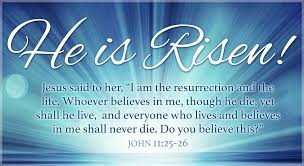Alleluia! Our Lord is risen and offers us new life! Jesus, the son of Mary, had truly died on the cross and overcame death as he rose on Easter. The resurrection of the body, the central mystery of Easter, is an essential Christian doctrine. As the apostle Paul declares so clearly: “[I]f the dead are not raised, then Christ has not been raised. If Christ has not been raised, your faith is futile and you are still in your sins. Then those also who have fallen asleep in Christ have perished” (1 Cor. 15:13–18). Because, as Paul tells us, the Christian is meaningless without this essential belief, it has been infallibly defined by the Church. It is included in the three professions of faith: the Apostles’ Creed, the Athanasian Creed and the Nicene Creed. We recite the Nicene Creed at Mass every Sunday and profess that Jesus “was crucified under Pontius Pilate, he suffered death and was buried, and rose again on the third day.” It is this miracle – life overcoming death – that we celebrate with such great joy today and throughout the Easter season!
But, our Lord’s Resurrection isn’t just important for Jesus, the son Mary. It is the foundation of our eternal hope, as well. We continue in the Nicene Creed to profess that the risen Lord “will come again in glory to judge the living and the dead and his kingdom will have no end.” We, who work throughout our lives here on earth to bring about God’s kingdom in our midst here and now, long to be part of God’s kingdom that “will have no end.” And so, we continue in the Nicene Creed to proclaim that we “look forward to the resurrection of the dead and the life of the world to come. Amen.” This remarkable teaching has been solemnly, infallibly affirmed by ecumenical councils down through the ages.
Today, we read in the Catechism of the Catholic Church this poetic presentation of our belief in the resurrection of the dead:
“‘We believe in the true resurrection of this flesh that we now possess’ (Council of Lyons II). We sow a corruptible body in the tomb, but he raises up an incorruptible body, a ‘spiritual body’ (cf. 1 Cor 15:42–44)” (CCC 1017).
Using the image of a plant that is sown, the Catechism affirms that we will receive an incorruptible body after death. This means that each of us, individually, will be given eternal life. This is our ultimate goal and one that fills all of us – faithful to God and the way his son, Jesus, has shown us – with inextinguishable joy!
As we marvel at the rebirth of nature all around us, let us contemplate the new life that the risen Lord promises us during these days of Easter! Our Lord has been raised from the dead and, aware that we are raised to new life with him, “Alleluia” is our cry!


